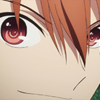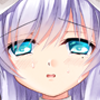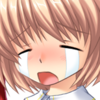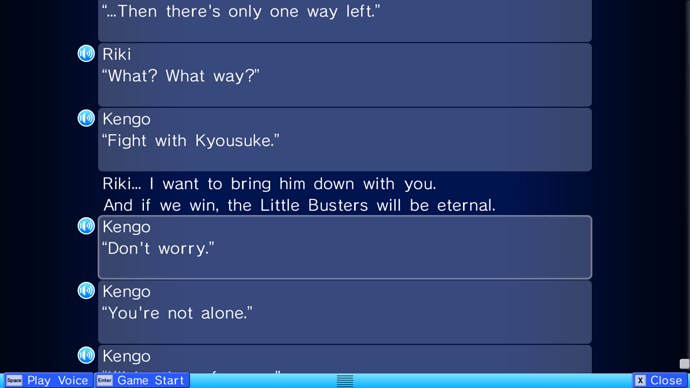I agree. It doesn’t invalidate their efforts at all. Kyousuke and the gang band together to help Riki and Rin grow so they can get over this tragedy, but what ends up happening is Riki (Rin as well, you could argue) instead uses their efforts to overcome another tragedy, the death of his parents. This allows them to avoid the bus crash from becoming a tragedy entirely. Kyousuke must have been dumbfounded.
What I like so much about the lesson Riki learns that allows him to overcome and deal with the tragedy of losing his parents is the exact same Kyousuke was teaching Rin.
In Rin2, Riki was wondering why Kyousuke keeps getting cats for Rin because she will keep having to say goodbye to them at some point.
The sadness of having to say goodbye to her cats at some point is better than not having met them at all. After all, Rin would be a lot less happy without all the cats around her. In other words, the encounter is much more important than the loss.
Gets asked why people have an interested in the It’s Enough ending, provide an answer I think pertains to the question, is suddenly faced with a mob of angry It’s Not Enoughers and their pitchforks…! 
Nah, no one’s angry, and I don’t think anyone took your statement as your personal opinion. We were just giving our own opinions on the idea.
Though, uh… if you did happen to be an “It’s Enough”-er, then uh… that’d be a different story. Because, y’know… 

 there’d be nowhere to run.
there’d be nowhere to run.
W-we weren’t forming an angry mob? hides pitchfork and torches behind back
GASP biggest shock of Refrain omg!!!
But yes, he is. And that’s what makes him great 
Actually, that reminds me of one point I wanted to bring up again:
I think you’re both right and wrong in this point, @Odinbeard_McSparkles. You’re right that everyone waits for Kyousuke; the Little Busters is incomplete without him, after all (or anyone else, for that matter). But they aren’t waiting for him to lead them. At this point, I can say that Little Busters doesn’t even have a leader anymore: everyone has their own quirks that they bring to the team, and lacking any one of them would make the team less interesting than it is. Sure, Riki attempted to step up in Refrain, and become the leader of the group of five, but when we put everybody into the group, he isn’t a leader either. He is the one that can gather everyone around (which kyousuke couldn’t do, mind you).
But we all have to admit: Riki is horrible at thinking of fun stuff to do. Shogi? Painting Pictures? Even after everyone is saved, his suggestions remain boring. And that is why they needed to wait for Kyousuke. Because Kyousuke’s role in the group isn’t to lead them either, it’s to think up crazy fun stuff to do, and make that a reality with his resourcefulness. And when he comes back he proves that yet again, with a rented van and a driver’s license, of all things.
So yeah, I like to think of the Little Busters as a “self organizing team”, each member bringing a different role, with no single leader, but with each role being just as important as the other.
After taking a long time to read all of the posts here, my first impressions of Refrain may already have left my memory in full detail, even though I refused to read on precisely so that other routes would not tamper with my impression of this.
I was very hyped when I saw the first screen being a crashed bus. So there really WAS an accident. But…are they dead? Probably…
Hm, okay but now we go into common…no, it’s different. Very different.
Yeah, Riki has developed a massive lot. We could see his progression slowly during the different common route cycles, but Rin2 seems to have made him step up even more than everything that happenes before. He really is extremely strong now.
Seeing Rin like this was…sad. Despite her not being a great character compared to others, I still really like her. This made me want to protect her even more, but it was also sad that it had to come to this. I really wanted to protect her. Probably a good emulation on how young Kyousuke felt.
Kengo went on to be very mysterious for a bit, he clearly knew more of what was going on, but he told nothing if it. That just added to my suspense. Then, when answers slowly started popping up in Episodes Masato and Kengo, the suspense still rose.
I was screaming a little bit when we went back to Rin2 during Episode Kengo, it finally confirmed a continuity that the route was only (heavily) hinting towards.
It got clear that they were not dead, but close to dying in Episode Kyousuke. He is such a great guy. Just think about all the nightmares he went through finally getting to the new starting point, and setting it as starting point was another big amount of pain.
Riki, forming the Little Busters again, and the swap, it was handled SO well. I loved it.
I was certain that the farewells in episode Little Busters were coming, so I though myself prepared for the emotions coming. But here again, all of them were handled perfectly. Masato is such a bro. Kyousuke’s crying face was so different of all of what we’ve seen from him, even though we knew he had that side, to see his well hidden weakness and strong emotions…well, that and Faraway broke me as well for a bit.
With all the other PoVs before and hearing and seeing Riki, I did not even realize for a while that Riki was voice acted during that episode and his own PoV as well for a bit.
Well, they’re dead. Credits? This can’t be it, can it? No, is not enough!
I honestly did not understand what happened until reading this thread. But that did not matter, as the field trip sequence hooked me anyways. I love how Kyousuke told you exactly what to do during his Episode. Why is the music in that scene not officially anywhere? It’s good.
The episode is so very happy and you can finally relax from the tension. I like what happens during the extra Rin epilogue even more. Everyone is fine, is about to handle their issues in their real lives, and have a big group of friends now. Kyousuke is a showoff as always.
I can see why one would prefer the other ending, but this is just the perfect ending I want. The other ending was just too sad. Both hold a lot of potential though.
Overall, while Refrain was really a great experience, it still disappointed me. That’s mostly because my expectations where just so much higher. I was basing my expectations of Rewrite’s final route plus all the hype that Refrain got from everyone who has read it. I know that hype is justified now, but it raised the bar so high.
It is still extreme great, and the more time passes after my initial disappointment, the more I can see the route for what it is rather than for what I expected it to be. And it’s starts shining. I also think it’s the best non-ex route in Little Busters!
And the ending was really awesome. Good alternative version of the Opening and great visuals!
(And now, I can finally actually dive into the Ex routes!)
This route is a goddamn amazing conclusion. Enough said.
Well, after a brief but enlightening discussion with @Pepe about this particular thread, I can’t condone the absence of the “It’s enough” legion, which I know that exists in Kazamatsuri.
I’ll start by addressing some ideas that just don’t work in my mind from other posts and then I’ll proceed to explain my view on the matter. However, my ultimate goal is for the people hiding out there to come out and defend the points that I’ll present and introduce more about why “It’s enough” is the superior option.
Please tell me where in all the routes and common Riki learns how to properly drag people out of a burning bus. Sure, without all of the events pre-refrain, Riki wouldn’t be able to do shit but he would’ve still tried because he loves the Little Busters. However, his probabilities of saving everyone remain almost unchanged, because he never received training in those situations. If anything, after all the pre-refrain events, he now has the ability to choose between it’s enough or it’s not enough. Because let’s face it, without his development, Riki would have rushed in there without thinking.
So all in all, Riki is doomed no matter what if he tries to save everyone. The fact that he manages to do so in Refrain is sheer luck (or retrying if you think of him as the reader), and by the same sheer luck, he might have managed to pull it off before the events. And I know the counter-argument to this is going to be the almighty narcolepsy, which I’ll save for later on.
Also, this part in particular:
The whole process is also absolutely necessary for the other choice, so what’s your point with that statement?
Yup, it would totally not fit Komari’s theme of accepting death as a part of life.
But what if “It’s enough” is also a story about friendship? Because I don’t see how choosing to follow Kyosuke’s instructions eliminates friendship as a theme or a message.
On the “It’s enough” ending
So let’s get back to what ignited these last posts.
Sure some people might think that, but in my eyes, the reason is more fundamental one. It’s not about recognizing the efforts. It’s about making the message of the VN consistent. Yes, Riki could’ve mindlessly done what Kyousuke told him to honor his and the rest of the busters’ deaths, but, there’s something that no one seems to realize. Riki, after learning all that he’s learned, might actually be able to choose “It’s enough” by himself without Kyousuke asking him to do so.
All the heroine routes have various messages but in their endings, they all share a common thing: accepting something undesired or simply accepting reality as is. Kurugaya reminds about the loop and how her pursuing her dream is selfish, Komari accepting her brother’s death, Kud accepting the catastrophe with her mother’s launch and how the fact that she failed in the past (when trying to become a cosmonaut) isn’t that big of a deal, Mio accepting Midori as some kind of double that doesn’t actually hate her, so that Mio doesn’t actually have to disappear herself…
So with all of this, Riki maybe would have taken a hint and decided that the wise choice is to accept the accident and not risk their own lives as well. Regarding @MagusVerborum’s concern about the message of friendship, it’s still there: their friendship was so strong as to accept each other’s desires of leaving things at where they are; their friendship made Kyousuke create a fucking parallel world to prepare Riki for the journey (because let’s face it, Rin makes some progress, but she kinda just tags along); their friendship allows them to wish for those days to never have ended. Their friendship is fucking everywhere regardless of the choice.
However, if you choose that it’s not enough, you essentially saying that you don’t want to accept death. Right, the message changes, and it becomes one of doing the impossible and where the power of friendship makes you save the day. I won’t argue about whether that’s good or bad in itself, but if you think of it including the rest of the route’s themes, you’re making the message of accepting the cruelty of life useless.
Komari, Riki (and I want to think that the reader as well) learn that accepting death is part of everyone’s life. What’s the point of this message if you ignore it when you have to best opportunity to put it in practice?
So to sum it up, my main issue is theme and message inconsistency. It’s building up, shaping and making characters grow to throw their progress out the window with an unbelievably lucky ending when the alternative is validating all of the themes exposed by the VN up to that point.
On Narcolepsy and its relation to both endings
The use of Narcolepsy throughout LB is sloppy at best. It is presented during the very first part of common, disregarded in pretty much all of the routes and then suddenly becomes the angular stone of the story in Refrain. There’s no buildup, no attention. It gets presented as something important at the beginning only to get to the end and be “Oh yeah, our main character had this condition, I don’t know, let’s make it a metaphor, a trauma or something that makes our character show his growth”.
After disregarding the issue of Narcolepsy for so much time, when we suddenly get it in the bus scene I can’t help but think “Oh for fuck’s sake what does this have to do with the problem at hand?” Then we see Riki getting over his trauma and stuff, so yeah, he overcame his trauma and, in turn, narcolepsy, but now what? How does that enable him to reliably save everyone? (This is mainly an addendum to the response to @machelmore).
Before I proceed, let’s make some different things clear:
-
Up to the infamous choice, Riki had the same development.
-
Riki making one choice or the other isn’t something to be regarded as significant development when it comes to overcoming Narcolepsy.
-
Riki losing the Little Busters is comparable to Riki losing his parents.
Many times I’ve seen that Riki overcoming narcolepsy is the pinnacle of his development, and I agree with that. But why have I never heard that Riki overcoming narcolepsy is guaranteed if he chooses “It’s enough”? According to the points above (and in fact, the second one isn’t even needed), Narcolepsy already has all that he needs and even more than with the other choice to overcome his trauma: He has exactly the same development and he has accepted the death of the Little Busters, something of the same caliber of his own parents’ death. There’s no way he can’t look at what happened to his parents and think “Hey, isn’t this exactly the same that happened with the Little Busters? Why am I still suppressing those memories with narcolepsy?”
Conclusion and final thoughts
I understand why many people love the “it’s not enough” ending. It presents a strong message and saves the characters that they love. As Magus said:
But come on guys, don’t tell me that the “It’s enough” ending can’t be good too? I’m not telling you that it should appear to be better than “it’s not enough” on your eyes, but at least try to understand how the other ending is a completely valid alternative to your favorite one.
And to the ones that I know that like the “It’s enough” ending the most and haven’t said anything so far: SPEAK UP. Sure, this discussion has been had many times in the recent years and it’s always ended with it being just a matter of subjective tastes, but isn’t that the beauty of it? Both endings can be both argued for and against and still be valid. Don’t let the bookclub end with just my post defending the inherent beauty of Riki’s development in this ending.
I think the difference with my viewpoint from yours is that you see of a message of “acceptance” throughout the VN, whereas I only really thought the message was there in Komari’s route. While I understand how you’re getting a somewhat similar message from some other routes, I don’t think it’s relevant and similar in the way of accepting the deaths of your friends and the deaths of the other Little Busters. For me it’s a bit of a stretch to interpret the routes like that, and I just don’t really see it. Which is the main reason I can’t agree that there’s inconsistency from the way you describe it, because I don’t think acceptance is the main message of the VN as a whole. I’ve had enough of that message from a certain previous VN, anyway.
See, I don’t think this is quite the case. I think the “it’s not enough” ending is the fruit of Riki growing stronger throughout the routes. I think it is because of him growing strong he is able to stay calm and collected, which allows him to save erveryone. I imagine that pre-refrain he would’ve panicked too much, and it’s why even having the choice as the player to pick the option to “calm down” is so significant. Riki has always shown to be quite clever and intelligent as long as he’s focused. So I would very much argue against it being mere luck, because all I see is Riki using his wits.
I won’t argue the narcolepsy part too much, you make some valid points but I didn’t have any problems with it personally. Obviously overcoming his narcolepsy is very relevant for saving everyone considering the things I explained in the paragraph above.
I can’t speak for the others but I never once thought the other ending can’t be good. I just don’t like it. So you can have your “superior” ending where all my favourite characters are dead and be happy about it for all I care, but I’m glad I have another option.
Mind not being so aggressive? Let’s not forget he’s speaking up in favour of a specific subset of people, and if people were more open to the possibility of both endings without falling to a mob mindset of “happier is better no matter what”, he wouldn’t have to intervene here.
The problem in this thread is that there’s no acknowledgement that It’s Enough has integrity within the story and just because It’s Not Enough is the “true route” doesn’t mean it should be backlashed against so badly when the precise point of that message is to see how fruitful Kyousuke and the others’ efforts were.
I didn’t meant it to be that aggressive, but I probably worded it very badly. While it’s already been quoted so there’s no point in editing my post at this point, I just meant to stress the point that I’m happy there’s an option for both sides. I don’t think happier is always better, but in this case specifically I liked it a lot more.
Looking at it again I did get too passionate there. Sorry about that!
Though I disagree with a lot of your points, I agree that it’d be good to see more “it’s enough”-ers around so we can have a broader discussion. I - and everyone else, I’m sure - didn’t join the discussion just to agree with each other on everything, disregard dissenting opinions, and call it a day. When I said that I feel like there’s no real justification on it, I was just getting my own opinion out there, not trying to tell anyone that they’re wrong.
With that said, I’ll get around to addressing why it is that I disagree with your points.
This is where I disagree. Throughout the events of the dream world Riki grew more capable of handling pressure and thinking things through. The problem is exactly what you said at the end.
He would’ve just run straight in there, moved Kyousuke away from the engine without thinking it through, and been blown to smithereens. He’s capable of calming himself down and thinking it through first because of how much he has grown in the dream world.
We see in Refrain a few times how Riki has grown craftier, demonstrated in the two traps he uses against Masato and Kengo respectively. Before the dream world, it never would’ve occurred to Riki to make a makeshift stretcher.
I don’t think the fact that he didn’t receive specific training for the situation while he was in the dream world means that he was no better off afterwards. The premise that he wouldn’t have been able to save pretty much anyone before the dream world, but is able to afterwards thanks to how much “stronger” he had grown - specifically due to the efforts of the Little Busters members - is why I think that choosing “It’s not enough” validates their efforts even more.
I agree that had the dream world situation not happened, it wouldn’t have been a choice, Riki would’ve run in and gotten himself killed. But here’s how I see it. A “weak” person wouldn’t be able to accept the situation and would try and fail to fix things at all costs. A “strong” person would be able to accept the situation and we’d get the “It’s enough” ending. An “even stronger” person however - someone on at least Kyousuke’s level I’d say - doesn’t have to settle for that, because they can do something about it. It’s made pretty clear that Riki surpassed Kyousuke’s expectations of his growth, and here’s where we see that.
Is Riki’s narcolepsy not caused - and triggered - by the fear of losing people? Just to name an example of when this is demonstrated, there’s Mio’s route. I’d say if it he doesn’t have a narcolepsy attack when confronted with the reality of all his closest friends’ inevitable deaths, then he wouldn’t have narcolepsy at all.
Because in the “It’s not enough” ending it’s not overcome by naturalistic means. The strength of Riki and Rin’s wish to save everyone enables them to create another dream world, wherein he overcomes it. I’m doubtful of the idea that he can just go “I don’t need it anymore” and then it’s just gone.
I’m in a weird state of half-agreement with you on this point. I agree outright with what you’ve said, but I also find that it’s not like any of the routes actively discourage striving for something more either.
I can see the “It’s enough” ending as good, but… part of it is just that it’s so sudden I guess. If you choose It’s enough, the game basically ends immediately. It feels incomplete to me at least. Maybe they should’ve built on it a little more.
I still don’t see how calming yourself down is a necessary and suficient condition for him saving everyone. That’s all that his progress allows him to do, because:
In a VN that is centered around solving psychological problems 99% of the time with the battle ranking and baseball being a completely optional minigame that doesn’t affect the story a single bit, I’d think of Riki growing his physical abilities as bullshit (not that it isn’t feasible). What I mean is that it’s something that has nothing to do with what the VN has centered around and wants to tell you, because I bet no one here got the idea that this VN’s message is “Train your crafts to become Macgyver”.
Completely subjective. For me going in is the action of a weak person, who can’t accept reality and is just childish, while saving your own life knowing that your friends are fine with that and lived a happy life and have no regrets requires a lot more emotional strength. Yet again, this is one of the reasons why this discussion is bound to not have an end.
What I mean with that is that the narcolepsy is so little touched upon in other routes that when we see it in that scene it feels like an undeveloped plot device that gets all of the development in the last minutes of the VN. Others might simply call this a waste of potential with an amazingly interesting condition for a main character
It’s not that he tells himself that he doesn’t need it: his narcolepsy comes from a trauma. He has overcome the trauma, ergo he, in turn, has overcome narcolepsy
Here’s a matter of what you pick as the most important message of the VN up to that choice. For me, it was what I explained. This is what’s nice about VNs, Novels, LNs and pretty much every media out there: you can choose what the message is, or rather than choose, there’s always going to be something in the media that will leave a deeper mark than the rest. Keep this in mind as I’ll come to it shortly.
YES. See, the problem here is that if you get from the whole VN the idea that the main message is to accept things as they are, picking “It’s not enough” is denying your own view of the VN. Don’t worry, it’s cool, we all know that every reader can consider as true the route that they want and so on and so forth, but, if we’re talking about what the VN wants to tell us and not about what the VN actually tells us, it’s pretty clear that the meaning of the VN lies within the “It’s not enough” choice.
Why’s that? Well, as you said, it’s a very sudden ending, as if the developers didn’t want you to stop there. There’s no ending theme (ofc Little Busters doesn’t fit in there, but come on, Song for Friends boys), there are no credits, no well developed epilogue.
When you choose “It’s enough”, all you get is “This is what happens, now go pick the other choice”. The VN is telling you that it doesn’t care about what you learned yourself and is essentially telling you that it’s cool, but you should probably rethink the message of the VN and go back to the other choice. Well, fuck that I’ve read through this and I’ve drawn the message that I want to draw. Can I at least get a half-developed ending, an ending theme or something that tells me that my choice also makes sense according to what I have personally read?
So yeah, if we’re talking about what the VN tells you the answers are plenty and all of them valid, but if we talk about what the VN wants to tell us… There’s only one answer and the ones that think otherwise are wrong.
Dude sees a bus crash site. In that crash are the people that replaced his parents who died in a crash. Sounds pretty triggering.
I don’t think it’s a specific “losing people” thing though. In some ways it is more a blatant rejection of whatever moment he is in, as if something overcame his emotional limit. I do doubt the mechanics of the in-dream world narcolepsy though.
I felt like that entire choice segment towards the end was thrown in lazily; both conclusions are sudden, and one of them ultimately doesn’t even matter since it exists purely to point you towards the “correct” ending. The correct ending fails to establish a crucial moral and so it feels out of place with the piece, despite conceptually sounding decent.
For example, we have this thought…
Which is a completely intentional conclusion for the VN. This is the concept that Riki grew so much through the VN that he has transcended Kyousuke’s (and the Busters’) grim expectations, overcoming the final challenge, and proving that things don’t have to end just because you think they will.
The problem is that the ending was far too sudden and incredibly tame. This is, in some ways, a TTGL style moral. It relies on some kind of hype, some kind of “beat reality” moment. It’s an ending completely at odds with the routes and Kyousuke’s teachings. Without the hype, it just feels like nothing really mattered…
Although I believe that’s also intentional. The VN even points such a thing out. It’s a conclusion where both the audience and the characters stay questioning it. “Is it even real?” I think. Is this actually how it ends, or is it just some kind of fantasy? To me, the ending never feels conclusive. It always feels like someone is ready to pull the rug out from under my feet. It’s uneasy, and uncertain, and everything that the cast would feel.
So yeah, I think both endings are intentionally bad. Doesn’t make it any better, but I can understand the idea.
First off, thanks again for posting this! I was hoping to see someone finally post about this controversial choice, and I’m glad you did. Now then, as many have already seen, I am very much an “It’s not enough” believer, but that doesn’t mean I can’t appreciate the values brought to the table by the “It’s enough” ending. And I will be the last person to push that there is only one “true” ending, since I believe visual novels don’t have true endings 
Now then, to add on my thoughts to some of your opinions…
This is actually a very subtle but good point; @Realta and @machelmore make a good points here, in that Riki doesn’t just learn lessons from the other routes, but he also learns how to stay calm and collected, and use his wits more (especially during the dream world sequence of refrain). That and, of course, the narcolepsy. But there is one very subtle point I’d like to emphasize here:
I’d like to point out that, all of the choices that we’ve done in Little Busters have had agency in them. What I mean is, all the choices in Little Busters happen inside the Dream World, and it isn’t a stretch to say that every time you go down one end because of your choice, that is yet another reset of the world. Heck, I wouldn’t even doubt that the game considers loading a save file to check out another choice also means a reset in the world. What I mean here is the choices that the players make in the game are directly connected to a mechanic in the game that makes this agency of choices possible…
All the choices except, of course, the saving the members from the bus crash. I think I have enough evidence to believe that the “It’s enough” ending is a continuation of Kyousuke’s simulation, intended to make Riki and Rin prepared for the worst outcome (by letting them experience it before it actually happens). However, once the player chooses “It’s not enough,” Riki and Rin create their own dream world, where Rin accepts her promise to Komari, and Riki overcomes his narcolepsy… They then proceed to save the members from the bus crash, but not without effort. The player (in extension, Riki), has to make the right choices. otherwise, they all die. And when you get the bad ending in those scenes, I refuse to believe that it is the game simply shows you a possible bad ending to this, like every other VN in the market.
So connecting this to our agency, where does that put the choices we make? Are the choices we make to save the team done in an extension of Riki’s and Rin’s dream world? If that is so, then it proves that without the “It’s not enough” choice, they wouldn’t make the dream world, and they would never learn the skills needed to save the team. My final say in this is that Riki and Rin gain these life-saving skills through simple trial-and-error, repeating their dream world until they find the right way to save their friends.
But if I am wrong and this does not happen in the dream world then, well, Mogaoscar’s points have ten times more weight then mine 
While Komari’s route is very blatant about this message, I feel that the other routes have other messages that either support the “it’s not enough” ending, or are totally unrelated. Kud’s route, for example, I believe is all about finding what’s important to you and dedicating your life to that. And to Riki, this important thing he could dedicate his life to was his friends.
If anything, i think it was kyousuke himself who was trying to push the “accept the sad things in life” message more than anything 
But right, by saying this, I also admit that, well, Little Busters doesn’t have a “central” message; I believe it doesn’t. I believe that every route has a message distinct to their own. Even refrain has its own distinct message, I might even say it has two distinct messages! One for either of the endings.
I also stick by my theory that it wasn’t Riki who learned from the messages of the other routes but Rin herself. More details in my last post in the Rin2 topic 
Actually, yes, I agree with you torally on this. Really the only time where his narcolepsy becomes a big deal was in Rin2… if they integrated it into more routes, it might have actually had more impact. In the end, it felt like Riki’s fight against his narcolepsy was just an after thought. Kinda like “oh I am strong enough to save everyone but I guess this narcolepsy is still biting me in the back. Time to go fix it”
I guess here is where I haven’t made my thoughts clear. Over the past years, people have been shitting on the “it’s not enough” ending, saying it ruins everything. Thus I’ve gotten pretty defensive about it  but my real, honest-to-god opinion is this: I value both endings equally. Yes, the “it’s not enough” ending is absolutely heartwarming, but the “it’s enough” has an impactful enough message to stand on its own… but people don’t see that because…
but my real, honest-to-god opinion is this: I value both endings equally. Yes, the “it’s not enough” ending is absolutely heartwarming, but the “it’s enough” has an impactful enough message to stand on its own… but people don’t see that because…
I think if they put the ending credits scene that comes before the choice (with song for friends, wasn’t it?) AFTER the choice, that would have pretty much fixed everything. Alas, you are right, the authors do try to push the “it’s not enough” ending as the true ending which goes against what I believe in. Ah well 
Ah, while “acceptance of loss” is indeed a huge part of the route, I’d say that the central message of the route is more about how acceptance allows us to move forward in life. Still closer to the “It’s enough” choice, but imo not terribly far off from the “It’s not enough choice” either. After all, being able to accept that something bad indeed happened to their group allowed Riki and Rin to move forward and gain strength to save them. 
(I still need to reread Refrain so I’ll get back to the ending debate later.  But yeah I felt like sharing what I thought of Komari.)
But yeah I felt like sharing what I thought of Komari.)
Guess I’ve waited for too long to post here. I still have to adress some posts I had left unanswered both from here and other topics, but I guess it would make more sense to adress the current discussion first. I’m kinda going in without a plan here though, so let’s see where this will go.
First of all, dear “It’s enough” believers, when you say “It’s enough” has a valid message behind it that should not be simply overlooked, I agree. When you say your favorite ending is superior, I disagree. And this is what this part of the discussion is about. It’s about why we value one ending more than the other. You are not being persecuted.
@Pepe has mentioned something like an important historical fact here:
Little Busters gets a lot of shit for “It’s not enough”, and only few actually bother to explain their point at all. Most of the time, their reasoning is simply “Killing characters is cool and mature and I am so cool and mature for prefering that. Letting characters survive is cheap and childish and I’m so cool and mature for hating those developments.” This isn’t even limited to Little Busters. Key in general gets criticized for its good endings a lot.
Try to remember some of the most hyped anime titles in the past few years. What they stand out for the most is that they are more disgusting than average and therefore, people flock to them - because they feel mature about finding value in what is normally considered disturbing.
So, especially for the veterans, defending “It’s not enough” has a lot of emotion behind it. Not only the emotions we live through because of the ending, but also because we had to defend it quite often.
Now, I prefer “It’s not enough” a lot over its alternative because… actually, I have already explained that years ago and I still stand by it:
Now to adress the points that have been brought up recently:
Firstly, while “It’s enough” would validate the efforts of the other Little Busters, “It’s not enough” does not invalidate them. The goal has been met either way: Riki had become strong enough to face tragedy without despairing.
Secondly, what about validating Riki’s efforts? “It’s enough” is a goal that has been set for Riki by Kyousuke and the others. Why should Riki be limited to meeting the expectations of others? After clearing the tasks given to him by the others with their help, he had set himself a new goal and accomplished it by himself. It is the greatest proof of his independence. Up until that point, Riki’s actions were mostly reactional. With “it’s enough”, he finally truly takes the initiative. Should Riki’s wishes and full potential be trampled for the sake of validating the efforts of others?
I have arrived at the conclusion that what the other heroine routes teach Riki is how to handle tragedy and horrible past in general. Therefore, I agree with you here overall, but disagree on the details. Especially, I don’t think the lesson of Mio’s route is what you think it is.
It’s not about not accepting death. It’s about challenging preventable death. Riki didn’t just throw a tantrum there. He said he would save everyone and he knew exactly what he needed to do. He knew he needed to become even stronger, and so did Rin. He also knew that he needed more time and that his narcolepsy was taking it away from him.
While the instances of Narcolepsy hitting were rare, and there wasn’t enough hints for the reader to figure out the meaning of narcolepsy by himself, the explanation is completely consistent thoughout the story. Apart from the random occurences that are natural for the disorder itself, Narcolepsy kept triggering whenever Riki was faced with loss, as @machelmore and @Takafumi have explained. That’s why it always happened in all the bad endings.
This is the most important point.
Riki did not commit suicide after losing his parents. Riki did experience happiness after the tragedy, yet he was still unable to accept it and developed narcolepsy. He was still able to enjoy youth despite having essentially given up on life. Kyousuke’s goal was to make Riki strong enough to deal with the loss of his friends and to become self-sufficient. So that he could still lead a normal life after the accident and support Rin, even without the help of a new Kyousuke. That was the minimum requirement of strength to live on, which he did acquire in the dream world. He did not become strong enough to actually fully accept the death of the Little Busters. And narcolepsy triggering at the accident site is proof of that! There was still some weakness in him. He wanted to overcome it and did exactly that by facing his greatest fear head-on. That’s why overcoming narcolepsy is the pinnacle of Riki’s development. Because the “It’s not enough” Riki is stronger than his “It’s enough” version. He could still live on normally after losing his friends, like he did after losing his parents, yet never fully accept it and narcolepsy would stay. Of course, he might get over it with time, which he would have plenty of, but it’s not guaranteed that he would face it eventually. On the other hand, his decision that “It’s not enough” gives him motivation to face his fears right then and there, because he needed the strength that lay beyond it to save his friends.
Therein lies a problem one might have with the narrative though. I’d say the story treats Riki’s disorder as a metaphor a majority of the time; there are a quite a few more bad endings than there are random attacks. Yet those random attacks still occur a few times, especially in Common when we’re first learning about it, so is it still a metaphor then? The expectations built by those early scenes and the disorder being tied to the name of one existing in the real world(Shoutout to Kanon for what it tells us about not naming disorders) are betrayed.
Obviously betraying expectations is a standard thing in writing, but it can give a wide range of responses from the reader. As it stands, the main response I see from the betrayal is a feeling of the narrative wanting to have its cake and eat it too. Had the “random” attacks actually had an obscure connection with Riki’s trauma, the reader would be able to go back after Refrain and rethink those moments. The character saying he has a specific disorder doesn’t necessarily make it so: doctors give incorrect diagnoses all the time, but are we to just assume that he was triggered in class? Now a second part of that idea is that the game masters demonstrate the ability to forcefully put Riki to sleep, but then the reader must ask if that’s satisfying. There’s also other annoying hypothetical questions like: “Why didn’t Riki get triggered when X happened?” (You can fill the blank with a stressful situation from any good end.)
This way of doing things is also contrary from the way the rest of Refrain functions. After learning the secret of the world etc. a reader can go back and see new angles to the old routes. However, the narcolepsy being depicted as both the real disorder and a subconscious rejection of reality opens up place for doubting the narrative’s internal logic.
I did not forget about you.
The way I see it in this discussion, you are arguing that in hindsight, Kyousuke’s plan was a success, because all’s well that ends well. However, Kyousuke did not intend to break Rin. He really wanted for both of them to grow. He repeatedly said so in Episode: Kyousuke. He always talks about the growth of both of them, not just Riki. But Rin broke, therefore, Kyousuke’s plan failed. He then made a new plan, focusing on just Riki, who made good progress, while giving up on Rin’s development and just making sure Riki can take care of her even if she’s weak.
In Rin2, he says to fight Kyousuke, because if he wins, the Little Busters will be eternal. During Episode: Kengo, he repeats the same thing in his thoughts.
The rejection of Kyousuke’s methods isn’t even a big topic for him until he becomes a victim of said methods. We could say that Kengo is a goal-oriented person, so rather than whining about how bad things are, is focusing on how to make it all better. But all we ever see him talk about is making Little Busters eternal.
Actions can very well be understandable and unforgivable at the same time. She made a choice, thus she is accountable for it. She used Riki, then threw him away. She chose Kyousuke, whom she supposedly didn’t trust anymore and who tossed her into hell, over Riki, who sacrificed everything to make her more comfortable. I won’t say she got her “just deserts” in the end, since that would be out of proportion. But she did do something horrible to Riki, wasted all his efforts and ended up hurting both herself and him with her decision.


